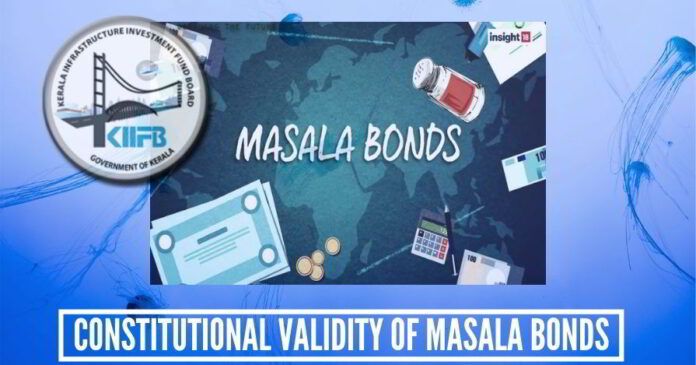
Masala Bonds issued by a sub-sovereign entity upon the sovereign guarantee of a State is a prima facie violation of Article 293 of the Indian Constitution
We find that major activity /momentous decisions taken in the midst of some other major political upheavals. For instance, during the heated debate in Rajya Sabha on dividing Andhra Pradesh, there was an “innocuous” mention of resignation of Mallya from Rajya Sabha –retrospective effect [1]. He left India using Diplomatic passport of being an RS MP etc. were not even considered. The resignation was accepted without any debate/discussion.
Similarly, in the midst of heated election campaign in the last two months Kerala Government floated—actually privately placed to some global institutions, what is called “Masala Bonds” through its Kerala Infrastructure Investment Fund Board [KIIFB]. Not much debate about it particularly when Rs 2150 Crore bond was offered at 9.723 % interest when similarly rated bonds are offered at 7.5% to 8.5 % from India itself. We will take up the financial implications in a separate note.
According to Article 293(1), it is clear that while States have the formal autonomy to borrow or raise debt within the territory of India,
Here we will focus on constitutional legality only.
Chapter II of Part XII of the Constitution of India deals with borrowing by the Central Government and State Governments. It comprises two provisions viz. Article 292 which covers borrowing by the Central Government and Article 293, which covers borrowing by State Governments. Since the focus of the present enquiry is State Debt, it is only Article 293 that is discussed herewith.
Constitutional History and the Rationale / Principle underlying Article 293
By analyzing the Constitutional history and the Constituent Assembly Debates with respect to Articles 293, we find that the provisions of Article 293 are substantially derived from Article 163 of the Government of India Act, 1935 (“GOI Act”). In essence, Article 163 allowed the Government of the Provinces to borrow any money upon the security of the revenues of the province. This was subject to any law made by the Provincial Legislature. If the borrowing was a loan from the Federal Government, then the Federal Government could impose conditions as it deemed fit. If Provinces had taken such loans and were indebted to the Federal Government, then the taking of any subsequent loans by the province from the market would be subject to the Federal Government’s consent. The same condition(s) would apply if the Province wished to take a foreign loan.
The principle underlying Article 293 is that the state government’s autonomy(or ability) to borrow is secured constitutionally. However, in cases where the Union Government has a direct stake (i.e. when the state is indebted to it or it has given a guarantee for a loan taken by a state) AND when the macroeconomic stability of the country may be threatened by a state government’s recourse to external debt or foreign debt, the State Government would have to seek the consent of the Union Government. Hence, Article 293 sought to strike a balance between the State Government’s autonomy and Union
Government’s control or oversight (which its drafters believed would be appropriate). This balance and rationale for Article 293 were further clarified and explained in the Expert Committee on the Financial Provisions of the Union Constitution presided over by Nalini Ranjan Sarker (appointed by the Constituent Assembly).
Scheme of Article 293
Article 293 is in four sub-clauses. Sub-clause (1) states the general principle that restriction on the State Government’s freedom to borrow or raise debt money in a situation when the loan in question is made by the Central Government or guaranteed by it. Clauses (3) and (4) pertain to further conditions and control by the Central Government.
We must now read every word of Articles 292 and 293 of the Constitution:
Article 292: Borrowing by the Government of India: The executive power of the Union extends to borrowing upon the security of the Consolidated Fund of India within such limits, if any, as may from time to time be fixed by Parliament by law and to the giving of guarantees within such limits, if any, as may be so fixed.
Article 293: Borrowing by States: (1) Subject to the provisions of this Article, the executive power of a State extends to borrowing within the territory of India upon the security of the Consolidated Fund of the State within such limits, if any, as may from time to time be fixed by the Legislature of such State by law and to the giving of guarantees within such limits, if any, as may be so fixed.
From a plain reading of the above two constitutional provisions, it is clear that while the Union Executive has the power to raise borrowings externally (within the limits set by The Parliament), the borrowing power of the State Executive is confined to raising loans only within the territory of India.
Thus, according to Article 293(1), it is clear that while States have the formal autonomy to borrow or raise debt within the territory of India, the spirit of the Article, in toto, is to subject State borrowing to the formal or de facto control of the Central Government. In practice, this control is exercised by the Department of Expenditure (DoE) in the Ministry of Finance which is the nodal department for granting consent under Article 293. Therefore, the legislative intent of Article 293 is for the Central Government have knowledge of as well as control of State borrowings, should the need arise.
The more important issue is if every state begins to access foreign bond or equity market then what is the implication for India’s external debt and servicing capability
Application of the Law to Masala Bonds
It may be noted that the Kerala Infrastructure Investment Fund Board (KIIFB), a Statutory board created under the State Government of Kerala, issued Medium-term notes of INR 21.5 billion that were listed on the International Securities Market of both the London Stock Exchange (“LSE”) and the Singapore Stock Exchange (“SGX”) in April 2019. However, these bonds (also known as “Masala Bonds”) issued by a sub-sovereign entity upon the sovereign guarantee of a State, is a prima facie violation of Article 293 of the Indian Constitution. Masala Bonds are in the nature of Foreign Debt or Foreign Loan and hence, covered by Article 293. It is clearly and explicitly stated in Sub-clause (1) of Article 293 that the executive power of the States extends to borrowing only within the territory of India. In other words, on a plain and literal reading of Article 293, we find that the State / State Government does not have the power to raise funds from outside the territory of India. Therefore, based on the fundamental principle of law that “what cannot be done directly cannot be done indirectly”, a State cannot raise debt finance or make borrowings outside the territory of India by creating a statutory body like KIIFB (because it is also regarded as “State” as per Article 12) or through other agencies of the State.
It is only the Union Executive that has the sole power to avail of the foreign loan(s) under Entry 37 of List 1, Seventh Schedule read with Article 246 of the Constitution. Since States are denied direct access to foreign funding owing to ‘foreign loan’ being within the sole legislative competence of the Central Government (to which the executive power of the Union extends), the Central Government may take on the loan on behalf of the States and on-lend the funds to the States. Hence, State borrowings has been done through on-lending of funds sourced from international institutions, multilateral agencies and other foreign financial agencies and companies. Most of these loans are to fund investment in infrastructure. (Following the recommendations of the Finance Commission XII in 2005, this money is loaned to the States in the non-special category on the same (marginal) terms at which the Centre receives the funding).
Further, Article 293 clearly states that the State Government can guarantee only debt or borrowings to the extent of the Consolidated Fund of the State. It cannot create a charge against the Consolidated Fund of India if the State borrowings exceed the Consolidated Fund of the State. [*Therefore, sub-clause (2) is not an exception or extension to sub-clause (1)]. Of course one may argue States, however, are allowed to raise from ODA (Official Development Assistance partners). But whether this comes under that category is another issue.
The more important issue is if every state begins to access foreign bond or equity market then what is the implication for India’s external debt and servicing capability. When domestic borrowing is limited by RBI restrictions etc. – prudence demands that this issue of international borrowings by states needs to be discussed and brought within some framework.
Another point to be noted with respect to the matter under discussion in this note is that a relevant query was also raised by the 14th Finance Commission:
What are the options for the Central Government to regulate sub-national debt in case States have not borrowed from the Union of India? In other words, this amounts to the Finance Commission seeking clarity on the role and oversight of the Central Government with respect to Article 293. Consequently, the “Policy Guidelines for permitting the availing of external assistance by State Government entities from bilateral agencies for implementation of vital infrastructure projects” laid down and approved by the Union Executive is also Constitutionally not valid or tenable.
We are therefore of the view that the issuance of these masala bonds by the State of Kerala through KIIFB is ultra vires the Constitution of India.
References:
[1] Vijay Mallya’s resignation’ – May 4, 2016, The Economic Times.











Can Modi govt do anything about this?? Can this be a sufficient ground for dismissing Kerala govt?! Many people in Kerala think they are from a different country and tend to behave Holier than Thou.
Communism-Congress is a Clubbing Combination of Corrupt Chamchas to Collude, Connive, Con and Cheat the Citizens to Create Confusion and Chaos.
believe- central law supersedes state law.
the communist government of kerala must know that- and yet they went ahead and offered those bonds at as bond offering higher coupon rate- claiming the issuer as central agency backed by the full faith of government of Bharat- which is fraudulent offer-acted by the kerala state- operated by the communist party- acting as government in power in the state of Kerala.
the state agency illegally offered those bonds- and buyer took it at face value without confirming its legality.
the buyer would eventually come to know.
that’s the desperation displayed by the communist party in power in Kerala.
crooked party- bankrupt – attempting to enrich personally by illegal means. I believe they did- flood disaster event in 2018- volunteer donations for victims. no word how it was distributed- suspect-enablers profited.
from that.
the communists- it is their turn to steal and run- revolving door- with congress party; voters are blind-deaf and dumb- those who keep voting for those two parties- BJP matter of time- will enlighten the voters and awaken them- it has begun.
How can RBI allow it? How can the foreign investors buy them without guarantee of Indian govt.?